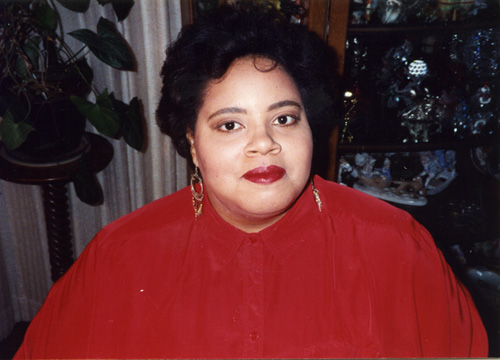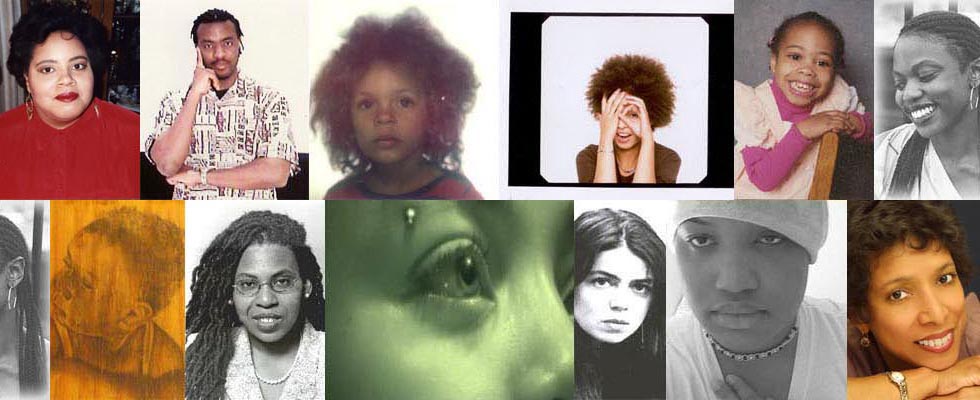Featured Poet: Niama Leslie
Williams, USA

"I
frequently do not err on the side of caution in my writing, but I
believe in the purpose of it: to speak to the things others
do not want to speak of, with the hopes of reaching that one woman, or
her lover, or her friend, who refuses to deal with her pain, who hides
from it, who doesn't think she'll survive it. That's the
audience I hope to reach."
-Niama
Leslie Williams
WYNTON,
AT LAST
after david hajdu’s article in the atlantic monthly
….
warm in my apartment
bed should be a vale of tears
but dawn is dawning
birds are chirping
and wynton, you have been the strong back
a sista needed.
let me tell you
not what i asked for,
let me tell you
what i got.
we come from a long line of greeting the dawners
happiest when the night starts at eleven
and bedtime is six
but you know, wynton,
the world
mamas
friends
bosses
don’t understand a need for dead of the night
don’t know that jazz hits at four a.m.
that the gates of heaven swing
in that stretch of time when the moon ain’t quite visible
iyanla, yes,
night is for making medicine
and reading of you,
wynton,
hajdu’s magic
i sipped my tonic:
vision of you, wynton,
speaking power
speaking love, family, determination
reverence
not an ondaatje poem for you
wynton
cause black reached across land mass to chastized coast
and angeleno that i am,
i knew suddenly, simply,
nocturnal was my vibe
no explanation
no looking back in horror
it don’t need to be about the past
it can be
wynton
that we are wired different
bird music
our lullaby.
i have been up til seven,
again,
my aunt would not approve,
but there,
in new york,
resting in the seat of jazz power
a complex man
nocturnal
night rider
knows what two a.m. means
frees me
at last
to greet the dawn
cracked smile and coffee cup
and pen.
FOR
THE NORTH PHILLY SISTA
i
don't stutter.
i eat.
i have never known that particular frustrated paralysis
but i have known the immediate loss of breath
when trying to walk two blocks.
what i understand now
is that a path has been cleared for me.
the ancestors who made white the sacred color
those who moaned and wailed yet refused to die
those who chose life
after the voyage
after the finger search
after the auction block
i am born of those people
who cleared a path for me.
i look at the women of north philly
the fat ones, with children, with food stamps,
with baskets filled to bulging only once a month
i wonder who speaks for these women.
i carry as much weight as they do
i wonder who loves them
if they have a caring doctor who does not give up
if they know there was a path cleared for them.
i am walking down a well-worn stretch
cause sonia has already stood on stages and declared black women poet
and baraka has already moved the rock that hid our music and kept it
from our verse
both larry and langston declared that we were black
that we would write
that we wouldn't cater to white audiences.
phillis did not know these road clearers
yet she was one.
they did not pull up a few weeds
or toss away a few pebbles.
no.
they moved boulders without bulldozers
tamed mountains without dynamite
poured no tar, mixed no asphalt,
simply hardened the path with their many, many feet.
and so i clear a path for the north philly woman
the overweight sista with too many children, food stamps, and the
latest do.
there is pain in the pounds that she carries
pain in not being able to reach good and wipe her ass
pain in the stiffness when she sits too long
pain in the steps she must climb one breath at a time
pain in the fourth drunk who figures she's an easy lay
pain in the clothes she stashes but cannot wear.
i am clearing a path for that sista
a path that will let her speak
a path with no curves and no steps,
no drunks and no food stamps,
no screaming children and no no-count men.
this path has jobs, size 28 pretty dresses,
ice cream cones that don't add to the waistline.
this is a path long fought for,
a path madison avenue does not want to see.
a path many, many descendants will keep free
of rocks, boulders, weeds,
a path part of the whole network of paths,
a path that simply must be.
WOMAN CITY
and
we are in new orleans. we are in new orleans. new
orleans.
--kalamu
ya salaam
it
is hard to be home, to feel home, when home is destroyed, abandoned,
heartsick. No one talks about how New Orleans might feel about
herself. Cause oh yea, she a woman, a vixen, a sista; she know all
about you and yo mama and yo granddaddy twice removed. She might even
have slept with him sometime; either that, or patted him on the head
when he was a young boy grieving over something irreparable.
No, no one asks New Orleans how she feel about herself. We all
focusing on the people, the brokedown, no longer existin houses.
Nobody tappin into how New Orleans sleepin at night, what she takin for
that persistent headache, how she trying, dammit, to clean her bowels,
the fact that her juju bag gone and she just missed seein the ghostly
face of the white man who took it. Heifer won’t know what to
do with
it, how to work it, but you know, we know, New Orleans know he prize
what he know he can’t control. New Orleans tryin to clean
herself,
repair herself, but all her magic gone.
I can see. I can see cause I ain’t there. I can see that
woman city
lyin in bed two or three in the afternoon and she been contemplatin
getting up since noon. I can see her lyin there, stroking a breast,
lifting a leg, admiring limbs that should be washed, polished,
gleaming, but she just don’t have the energy right now, her
juju bag
gone and the wind done took all her stuff. Bathin when the water done
tried to drown you ain’t a healthy prospect.
She contemplatin getting up, but she need something. What. Her juju
bag for one. That the real source of her malady. Never should have
run out of goat foot for her juju bag. She know what essential, but
that night, that day, she had moved slow, bearing the weight already of
something come to wipe her out, something come to drown her but good.
So do I get up, she ask. The people want. They want me up and fat
and sassy and shinin with warm spirit lavender belly butter. They want
to hear the magic of my laughter again. They want me up and down the
streets no foreigner can pronounce lessen he been to france and the
lower ninth ward, sashayin and laughin and remindin folks what a good
time is, what it really means, the healing quality in a raucous,
soul-altering good time. Far more than a hoot at midnight, an octaroon
ball, the much ballyhooed Mardi Gras. A good time serious, and she
know that. She wonder if she ever gone get up for a good time again.
They try, the people. They got up a secondline moving through town,
trying to remind her, trying to stir her from her bed. One sistagirl
sacrificed her fiancé to love of this town, this woman city,
but she,
n.o., she was missing the something inside herself would make her care.
There’s a hole, deep and profound, a yawning cavern, and too
much
madness to close it up right. No one came to help, and that’s
something this woman city can’t forget, won’t
forget, holds forth,
accusatory. You let my people drown, she pauses, reflects; you let
them drown and you left them alone. So why the fuck, how the hell you
want me out of bed?
She lies back down, stretches, watches the bleach-white curtains dance
as they hang around her canopied bed. From afar she is a dark brown
sista in pale yellow dress witnessed through bleach-white curtains. A
half-finished, ignored glass of kahlua and coffee by her bedside. She
doesn’t wish to be awake; not without her juju, and not with
her people
looking accusatory at everyone, at her. You got to get up now, they
are saying, whispering, trying to cajole. You got to get up now, cause
if’n you don’t, we’ll die.
We’ll atrophy, our souls will become that
water that tried to kill us, and we’ll drown in the driest
grief man’s
ever known. You got to get up now, they demand, stoicism in their
right hands.
She’s meditating. Maybe. She does rise periodically, looks
out her
glass window—it survived to torment her with a window in on
an
unreachable, now, past—feigns interest, turns back to her
bed. All of
this devastation hurts, the hole causes pain as it makes itself wider,
if she doesn’t get her juju back soon, she might kill
somebody.
The turmoil don’t quit. Her people hold their breath; live
elsewhere,
watch her whenever they can spare a moment from alternate, hesitant
lives. They hope when they dare; they are human after all.
She holds a dark brown arm up next to a bleach-white sheet,
contemplates murder, contemplates rising. Looks toward the window, and
breathes.
Bio
Niama
Leslie Williams is a poet and scholar who happily teachesliterature,
creative writing and composition. Born and raised in
LosAngeles, California, she recently earned her doctorate in
AfricanAmerican Studies from Temple University in Philadelphia,
Pennsylvania. She also possesses degrees in comparative
literature and professionalwriting from Occidental College and the
University of SouthernCalifornia, respectively.
In
addition to attendance at the Squaw Valley Community of Writers,Ms.
Williams has participated in the Hurston/Wright Writers Week andFlight
of the Mind. Her work has appeared in Poets & Writers
Magazine,Dark Eros: Black Erotic Writings, Spirit & Flame: An
Anthology ofAfrican American Poetry, Catch the Fire: A
Cross-Generational Anthologyof Contemporary African-American Poetry,
Beyond the Frontier: AfricanAmerican Poetry for the 21st
Century and in Mischief, Caprice, andOther Poetic Strategies.
Her prose publications include essays andshort stories in MindFire
Renewed, P.A.W. Prints, Midnight MindMagazine, Amateur Computerist,
Tattoo Highway #6, Obsidian II: BlackLiterature in Review, and
Sojourner: The Women’s Forum. Her short story
“Marcus Welby, M.D.” won third place in the First
Person FestivalWriting Competition sponsored by the Philadelphia City
Paper.
http://www.niamalesliewilliams.citymax.com
|

